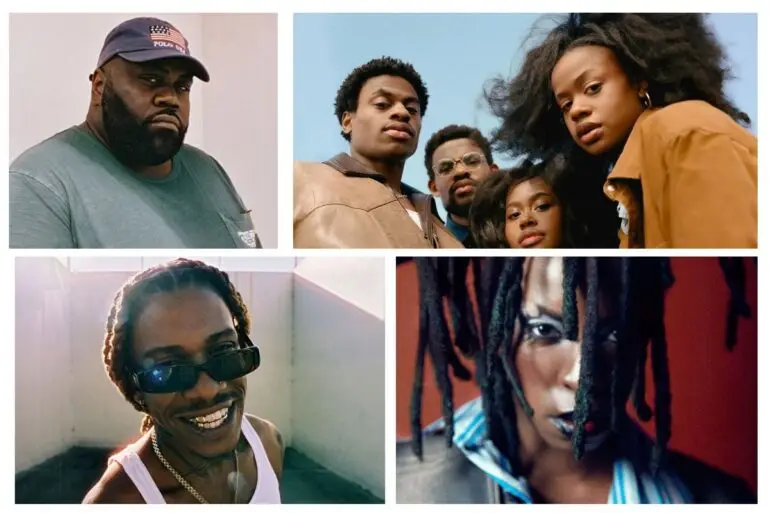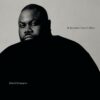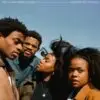Samara Joy comes from a family of gospel singers and has been singing all her life. In her teens, she performed as a soloist in her church choir, but her career really launched in 2019, when, as a college student, she won the Sarah Vaughan International Jazz Vocal Competition.
“I was definitely an imitator of Sarah Vaughan for a while,” Joy says. “Every time I listened to a recording of hers, there was something special about it. There was something different. … I subconsciously wanted to have a wide range like hers.”
Studying voice in college helped Joy better understand her own voice — and her own approach to songs. “I learned not only about the foundational things, but about phrasing and having control over my voice and not just looking at a song as just something to sing, but, like, actually delving into the story and the lyrics and utilizing whatever tools I have technique wise to, to bring the song to life.”
In February, Joy became the second jazz performer in Grammy history to win the award for best new artist. Her latest album, Linger Awhile, also won a Grammy for best jazz vocal recording.
Transcript :
TERRY GROSS, HOST:
This is FRESH AIR. I’m Terry Gross. I am really looking forward to what we are about to hear. My guest, Samara Joy, is going to sing for us with her band. Last month, she became the second jazz performer in Grammy history to win the award for best new artist. To top it off, she also won the Grammy for best jazz vocal album. The album is called “Linger Awhile.” She’s 23 and didn’t really immerse herself in jazz until she was in college. While she was studying music at the State University of New York’s Purchase College, she won the Sarah Vaughan International Jazz Competition, which helped launch her career. She posted a video of her singing as a thank-you to the people who funded her scholarship, and it went viral. That led her to start a GoFundMe page to pay for the production of her first album, which she recorded in 2020 while she was still in college.
She comes from a family of gospel singers. Her grandparents co-founded a gospel choir in Philadelphia called The Savettes and traveled around Philly preaching in their Godmobile (ph). Her father is a singer and bass player who toured with gospel star Andrae Crouch. Samara Joy was a soloist in her church choir in the Bronx. Joining her today is Cameron Campbell at the piano, Michael Migliore bass and Evan Sherman drums. They’re joining us from the studio of WNYC in New York.
Well, welcome to all of you. Thank you so much for coming. Samara, I really love your singing, and it’s so great to have you here. So I’d like to start with a song that you include on the new album. It’s a song by Frank Loesser, who also wrote the score for “Guys And Dolls,” and Jimmy McHugh. The song is “Can’t Get Out Of This Mood.” And I’m wondering, like, why did you choose this song? What does it mean to you? How did you first hear it? It’s not a song that many people do.
SAMARA JOY: Yeah, I heard this first from Sarah Vaughan and later on from Nina Simone. And I realized that at the time of choosing it, I was attracted to a lot of sadder torch songs. And so when I heard it, you know, I was like, this is something a little bit more upbeat and positive to add to the repertoire, and that’s why I love to sing it.
GROSS: Well, I’d love for you to sing it now.
JOY: Here we go. (Singing) Can’t get out of this mood. Can’t get over this feeling. Can’t get out of this mood. Last night, your lips were too appealing. The thrill it should have been all gone by today in the usual way. But it’s only your arms I’m out of. Can’t get out of this dream. What a fool to dream of you. Wasn’t part of my scheme to sigh and tell you that I love you. But I’m saying it, and I’m playing it dumb. Can’t get out of this mood. Can’t get out of this mood. Can’t get out of this mood. Heartbreak, here I come. (Vocalizing). Here I come.
GROSS: Oh, thank you so much.
JOY: Thank you.
GROSS: Love your voice. So, you know, when you accepted the Grammy for best new artist, you said that you were amazed at being here by just being yourself, by just being who you were born as. What did you mean by that? Because you seem really overwhelmed by the idea of being here by just being yourself.
JOY: I was very overwhelmed, and I wish I could go back and do it again. But I guess what I meant – really, in my head, what I was trying to say was, you know, a lot of times in the music industry or from the outside looking in, you see people change or they’re kind of forced to change in order to fit in or forced to blend in or assimilate alongside all of these creatives in order to get their shot. And so I felt like it was incredible for me to even be in that room and be a part of something so special, part of that night, without having to necessarily change anything about who I am in order to fit in. It’s like, I fit in already by just being myself.
GROSS: And for both of your acceptance speeches at the Grammys, you said, I’m from the Bronx. I can’t believe I’m here. What was your neighborhood like in the Bronx?
JOY: Well, for me, you know, it was half and half chaotic and peaceful, you know, if that makes sense. My grandmother bought a house in the Bronx that we all lived in and still, you know, have and own to this day that was kind of, like, half in the suburbs and kind of half in the, I guess, the more dangerous, you know, side of town. And so I went to public school. I saw a lot, you know, growing up, but thankfully, you know, my dad, he would pick us up and drop us off from school every single day. And so I don’t know. It’s just every time I’ve talked to anybody about the Bronx, they’re like, oh, it’s, you know, crazy over there. Like, for me, I had an amazing childhood, an amazing time in public school and going to school and stuff.
So I don’t look at that as, like, even though I’m from the Bronx, I made it out. You know, it’s like, there’s potential and there’s talent, and there’s people with dreams everywhere, you know, no matter where you’re from. And it’s just like, if you have somebody, supportive family or a teacher who believes in you or wants to support you or – and people around you that want to help and lift you up, you know, it doesn’t matter where you come from or where, you know, they say that the reputation is bad and they say, you know, don’t go there or that kind of thing. So I guess that’s what I meant. I’m proud of where I’m from.
GROSS: What’s a song you heard early on when you were first getting excited by jazz that made you want to sing it?
JOY: I can remember being – one of my – when I was, like, asking my professors what records I should listen to, my vocal teacher, Alexis Cole, she told me to check out Sarah Vaughan live “At Mister Kelly’s,” which is an amazing recording. And I listened to “Stairway To The Stars” and I’m going to sit right down and write myself a letter. And, yeah, that was, like, one of the main recordings that I fell in love with early on.
GROSS: Would you sing a few bars just a cappella of “A Stairway To The Stars”?
JOY: (Singing) Let’s build a stairway to the stars and climb that lovely stairway to the stars. It would be heaven to climb to heaven with you.
GROSS: Yeah, great. So Sarah Vaughan was obviously one of your first influences, and you won this the Sarah Vaughan International Jazz Vocal Competition. Did you listen to her over and over and try to understand what she was doing?
JOY: Leading up, oh, yeah. I mean, even before, you know, the Sarah Vaughan – because the Sarah Vaughan Competition – I auditioned at the end of my sophomore year going into my junior year. But before that, you know, freshman and – all of freshman and sophomore year, she was one of the main singers that I was listening to because, honestly, I was listening to Ella for the melody at the time for my repertoire classes. And then I was listening to Sarah Vaughan’s recordings for ways that I could switch it up, you know, and make it and like – because she is always – every time I listen to a recording of hers is, like, there was something special about it. There was something different. It was like, I never imagined you could sing the melody in this way or, you know, emphasize this word or, you know, harmonically, whatever she was doing ’cause she also played piano and had incredible ears. So, yeah, I was definitely an imitator of Sarah Vaughan for a while.
GROSS: What I think you share with her is just the depth of your voice and a similar range. Like, your vocal placement seems similar. You both have kind of deep voices.
JOY: And I also – I guess I subconsciously wanted to have a wide range like hers because she could sing incredibly low, but also…
GROSS: Right, yeah.
JOY: …Had this operatic head voice that was just – it was so strong and so light and airy at the same time, so…
GROSS: What did you learn about your voice studying voice in college? – because you’d already sung a lot with choirs in church.
JOY: I think the main thing I learned probably was I needed to control it more. I think I was – it was either you sing soft or you sing loud. I didn’t really have any sense of dynamics at the time along with, like, things like breath support, you know, and practicing that and being in tune. And I took classical lessons for a year while I was at Purchase as well. And so I learned not only about the foundational things, but about phrasing and just being – having control over my voice and not just looking at a song as just something to sing, but, like, actually delving into the story and the lyrics and utilizing whatever tools I have, techniquewise, to bring the song to life.
GROSS: Well, I’d love for you to do another song. And on your new album, you do “Round Midnight,” and it’s a really beautiful version of it. I like the darkness of it that you bring out in your interpretation. So this is a song – unlike “Can’t Get Out Of This Mood,” this is a song that, like, lots and lots and lots of jazz musicians do. I think it’s one of the most recorded songs in, like, jazz record history. Why did you want to sing it? And what did you want to bring out in it?
JOY: Well, I knew that I wanted to record it and sing it when I heard Carmen McRae live on “Jazz Casual” with Ralph Gleason. I heard her do it on his show, and she did these lyrics. And I was like, I’d never heard them before, you know? And she’s, so far, the only recording that I’ve heard of Jon Hendricks’ lyrics to “Round Midnight.” And so I wanted to – I don’t know. I wanted to sing those lyrics. And I also wanted to, I guess, open up a side of myself, express more of the deeper – the warmth of my voice in this song.
GROSS: Well, if you and the band can do it for us, that would really be great.
JOY: (Singing) A pale and lonely moon lights the sky in the dark before the dawn. I sit here in my room. How I sigh for the day that’s come and gone. Another lonely day passes by, and a new day’s coming on at midnight. Tears I’ve shed today will pause, waiting until tomorrow. Dreams of what could be come close to me, timidly. There’s a brand-new day in sight at that time ’round ’bout midnight. Life’s a game of chess. You’re just one of the minor players. Look for what you love. The day to come harbors some. Let your spirit stop the fight at that time ’round ’bout midnight. Every day is going to bring some sadness. Every day is going to bring some gladness. Take what you can of the glad times. Don’t measure your pleasure in nickels and dimes. Look back, look back, look back on today, and you’ll know when you have been unhappy. Fears done chased away just might, at night, have their day. Let your eyes put out their light at that time ’round ’bout midnight.
GROSS: That was beautiful. Thank you so much. So that’s Samara Joy singing. That song was also on her latest album, “Linger Awhile,” and accompanying her, Cameron Campbell at the piano, Michael Migliore, bass, and Evan Sherman, drums. Well, that’s a tough act to follow. Let’s just take a break here, and then, we’ll talk some more. So if you’re just joining us, my guest is double Grammy award-winning singer Samara Joy. And we’ll be right back. This is FRESH AIR.
(SOUNDBITE OF SONNY ROLLINS’ “TOOT, TOOT, TOOTSIE”)
GROSS: This is FRESH AIR. Let’s get back to my interview with Samara Joy. Her latest album, her second, is called “Linger Awhile.” It won this year’s Grammy for best jazz vocal recording, and she won this year’s Grammy for best new artist. She’s singing for us today, and accompanying her are Cameron Campbell at the piano, Michael Migliore bass and Evan Sherman drums.
So let’s talk about your musical background because you are relatively new to jazz, but you are steeped in gospel music. Your grandparents and your father all sang gospel. So let’s start with your grandparents. Your grandmother co-founded a gospel choir in Philadelphia called The Savettes. There’s a story behind the choir. Could you tell it?
JOY: Well, I remember asking my grandfather, you know, how did The Savettes get started? And he told me that my grandmother, Ruth McLendon, paternal grandmother, got together – originally, the group between the wives, I guess, of the church was to – it was an effort to save money, to round up money together. But they started each saving meeting with a song. And one of her friends actually said, you know, this sounds good. We should bring our husbands in and maybe start a group. And so they had rehearsal. You know, they sang through a couple of different things, and the choir was born.
GROSS: Did your grandmother study opera?
JOY: Not that I know of, actually. No.
GROSS: ‘Cause she has a kind of operatic range.
JOY: I think all of the studying came in church because I also remember a story of my grandfather, who is 92. I just talked to him the other day. He got – he actually got an operatic – like, I think it was a recording contract to sing opera. And I think she threw it in the garbage because I think at that time, you know, it was church or nothing – sacred, no secular. So they all, I think, did their thing from singing in church.
GROSS: Wait. So did he or she get the contract?
JOY: He did.
GROSS: For him to sing opera, and she threw it in the trash.
JOY: Yeah.
GROSS: Did that carry over to you, that they didn’t want you to sing secular music?
JOY: Yeah, my grandfather was definitely hesitant about it at first. Even with me going to school, you know, it’s like, music isn’t – doesn’t belong in school. It belongs, you know, in the church. And so, you know, I think now it’s safe to say he’s come around because he called me the other day and was like, yeah, you put The Savettes on “The Jennifer Hudson Show.” And…
GROSS: (Laughter).
JOY: You know, so I think he’s realizing there’s more than one way to spread the gospel.
GROSS: Right. So I’d like to play back-to-back recordings with your grandmother singing with The Savettes and with your grandfather singing with The Savettes. So let’s hear that.
(SOUNDBITE OF SONG, “WHAT IF HE CAME BACK TODAY”)
THE SAVETTES: (Singing) I don’t know when, but it’s coming. In His way, you’ll find, child, He’s on the way. He gives the fig trees in bloom room as it was anyhow. Yet it’s known that He’ll come to this world (ph). What if he came today? Would you be ready?
(SOUNDBITE OF SONG, “BELOVED, NOW ARE WE”)
THE SAVETTES: (Singing) Beloved, oh, beloved, we are the sons of God. And it doth not – it doth not yet appear what we shall be. But we know that when He shall appear, oh, but we know when He shall appear…
GROSS: So that was Ruth McLendon and Elder Goldwire McLendon singing back to back with their gospel choir, The Savettes. And they are the grandparents of my guest, Samara Joy, who is now a double Grammy Award winner. Well, let’s take another short break here, and then we’ll talk some more. If you’re just joining us, my guest is Samara Joy, and she won this year’s Grammys for both best new artist and best jazz vocal recording. And that was for her latest album, “Linger Awhile.” We’ll be right back, and she’ll sing some more for us with her band after this short break. I’m Terry Gross, and this is FRESH AIR.
(SOUNDBITE OF SONG, “NOSTALGIA”)
JOY: (Singing) Nostalgia hit me as I recalled the day I knew that I loved you. You passed me by on a starry night. How could I forget? You were stunning. A vision of perfection, heaven’s very essence – that you were, a shining star to me.
GROSS: This is FRESH AIR. I am Terry Gross. Let’s get back to my interview with Samara Joy, who’s joining us with her band from the studio of WNYC in New York, where she’s performing some songs for us. Her latest album, “Linger Awhile,” won this year’s Grammy for best jazz vocal recording. This year, she also became the second jazz performer ever to win the Grammy for best new artist. She recorded her first album in 2020, when she was still in college. She was already used to singing in public as the lead soloist with her church choir in the Bronx. Her paternal grandparents sang gospel. Her father toured with gospel star Andrae Crouch.
Your grandparents had a Godmobile, basically a van that drove around Philly. I live in Philly, but…
JOY: Yeah, never seen it (laughter).
GROSS: …I never saw (inaudible) before I moved here. So what was that like? Do you know?
JOY: Well, my dad told me about it. He is like, my – his mom, my grandmother Ruth, had the idea to kind of – what’s – they call it soul saving – and so go out into the streets of Philadelphia and preach and sing and tell people about God. And so they rented a van. Or I don’t think they rent – or maybe they – did they rent a van? – either rent or bought or, you know, a friend gave it to them. And they wrote in big letters, Godmobile. And he and my aunts and uncles got in the car, and my grandmother would pick a random corner. And they would set up and have church.
GROSS: Did a lot of people show up or just pass by?
JOY: Yeah, they – you know, there were a lot of passersby ’cause – since it was, like, on sidewalks normally. But my dad does tell stories about people walking by and actually engaging and, you know, singing along and eventually getting saved and stuff.
GROSS: That must have been interesting, just on the corner.
JOY: Yeah, I know. Just driving by, like, what’s that commotion over there?
GROSS: So did they preach as well as sing?
JOY: My – yeah, my grandfather and grandmother were both pastors, and they had a church for a while. They moved to Tennille, Ga., and had their own church for, I want to say, 15 years, something like that, before moving back to Philadelphia later on. So, yeah, they were both pastors.
GROSS: You sang in church during your teen years. You were, like, the lead singer of the choir. Is that the right way of putting it?
JOY: Yes, I joined – so I joined a church that was actually up the street from my high school when I was around 15. And I started in the choir. And then, eventually, they kind of let me sing with the – it was, like, a praise and worship leader. Like, there were about – there was a choir, and then, there were about eight singers that normally took the stage with actual microphones. And so they let me lead a couple songs before eventually naming me one of the worship leaders. And so I did that from the time I was – yeah, from the time I was 16 until I graduated from high school.
GROSS: Can you sing a little bit about – one of the gospel songs that you sang in church that you felt most deeply – that most deeply moved you or connected you to, you know, the world beyond self?
JOY: I can do – OK.
(Singing) Blessed assurance, Jesus is mine. Oh, what a foretaste of glory divine. Heir of salvation, purchase of God, born of his spirit, washed in his blood.
GROSS: I want to quote something that you said. I think this was in an interview with the BBC. You said, in church, we come to connect to something greater than ourselves. So if I’m the vessel for that, then I have to be completely free of any sort of ego or nerves. That’s what I still keep with me now. I thought that was a really beautiful thing to say. And when you sang in church, like, you were a teenager. Like, you were 15, 16. It’s a very deep thought for a 15- or 16-year-old to have, to think of something greater than yourself and of you being a vessel without ego. Did somebody talk to you about that? Is that an idea you came up with yourself?
JOY: I mean, it’s kind of a mix of both. You know, it was what was taught, you know, and as far – it was taught before, you know, being named a worship leader as, like, my role, you know, as far as leading people in praise and worship. But also, it’s just kind of what I saw, you know, around me. My dad, he was also worship leader at the time. And, you know, when I went to him, you know, thinking, like, I can’t really do this, I’m not sure if I’m ready for this, he was like, well, it’s not about you, you know? And if you were, you know, chosen to, fulfill this particular role at this time, you know, it’s for a reason. And so don’t think about, you know, having to be perfect or having to be the best singer in the room or the best, you know, whatever in the room. But just focus on being not only yourself, but focus on being open and having your ears open and your spirit open to whatever the moment calls for.
GROSS: I could see the idea of being chosen working in two ways. On the one hand, like, that’s a lot of pressure. Like, you were chosen (laughter), you know? So you’d better fulfill the promise. On the other hand, it takes the pressure off for the reasons you just mentioned. Did you feel both sides of that, the pressure and the lack of pressure?
JOY: I did. I did especially because I was kind of like, why me (laughter)…
GROSS: (Laughter).
JOY: …In a lot of ways, you know? I was just like, I don’t – this is, like, before jazz, before SUNY Purchase, before, you know, venturing into jazz, before having proper vocal lessons and stuff. So I just felt – I felt like I was excited to do it, but I just felt kind of unprepared. And so, yeah, I felt the pressure. You know, it was definitely – it was a bigger church than, I guess, normal. You know, it was livestreamed, and there was a big congregation that came in every week. And people would tell me, you know, we like your singing, but you just don’t blink up there. It’s like we can tell, you know, you’re really nervous. So I did – I felt the pressure. But then, again, I feel like it was the perfect space to grow and develop because people were very loving and supportive of me in that time.
GROSS: Let me reintroduce you. My guest is Samara Joy, and her latest album, which is called “Linger Awhile,” won the Grammy for best new jazz vocal recording. And she won this year’s Grammy for best new artist. We’ll be right back with more music. She’s going to sing with her band after we take a short break. This is FRESH AIR.
(SOUNDBITE OF SONNY ROLLINS AND TOMMY FLANAGAN’S “H.S.”)
GROSS: This is FRESH AIR. Let’s get back to my interview with Samara Joy. Her latest album, her second, is called “Linger Awhile.” It won this year’s Grammy for Best Jazz Vocal Recording. And she won this year’s Grammy for Best New Artist. She’s singing for us today. And accompanying her are Cameron Campbell at the piano, Michael Migliore bass and Evan Sherman drums.
I want to get back to talking about your family. We talked about your grandparents. Your father sings gospel and plays bass and toured with Andrae Crouch, who died in 2015 but was a really big star in the world of gospel music. And he was a singer. He was a composer and arranger. He did work on movie scores. So what – did your father sing and/or play bass? Like, what was his role touring?
JOY: From those tours, I remember him doing both. And there’s actually a video of him singing Andrae Crouch’s – one of his more famous compositions. I believe he says he wrote it when he was, like, 15 years old. It was called “The Blood Will Never Lose Its Power.” And we sang it together, actually, on the anniversary of his passing when I first started getting into TikTok, me and my dad. But, yeah, those were the days when I would watch my dad go on tour, you know, and be gone for a while, you know, in, like, fifth grade, sixth grade, going on tour with Andrae Crouch.
GROSS: You mentioned “The Blood Will Never Lose Its Power.” You duet with your father in a social media post – or TikTok, like you said. And I think it’s a great duet. So I want our listeners to hear it. Do you want to say anything? So I guess this was on the occasion of Andrae Crouch’s death. But he died in 2015.
JOY: Yeah, but it was, like, on the anniversary. It was – I think we posted it on…
GROSS: The anniversary. Oh, I see. OK.
JOY: …January 8 or something like that. That was when he passed – the day that he passed, at least.
GROSS: So this is the Andrae Crouch song “The Blood Will Never Lose Its Power” sung by my guest, Samara Joy, singing with her father, Antonio McLendon.
(SOUNDBITE OF SONG, “THE BLOOD WILL NEVER LOSE ITS POWER”)
SAMARA JOY AND ANTONIO MCLENDON: (Singing) It reaches to the highest mountain. And it flows to the lowest valley. Oh, yes, it’s the blood that gives me strength from day to day. It will never lose its power.
GROSS: OK. That was a social media post of my guest, Samara Joy, singing with her father, Antonio McLendon. And that’s really great. It must be so great to sing with your family.
JOY: Yeah, it really is. I grew up, actually, listening to them sing. They had an album, actually, produced by Keith Diamond, who’s my uncle-in-law. And he worked with Michael Bolton and James Ingram and Donna Summer. And he produced a family album for the McLendons that I’d listen to all the time. It wasn’t released officially, but we have the bootlegs (laughter). And so listening to them sing my whole life and copying them, and to now – you know, we did a tour for Christmas because we released a holiday single, “O Holy Night.” And we got the chance to go on tour together and sing together. So it really is a blessing.
GROSS: So your grandparents, especially your grandfather, I guess, was really opposed to singing secular music at first. What about your father? Did – he, I think, had a pretty extensive record collection beyond gospel.
JOY: Oh, yeah. And he was definitely – both my parents were very supportive of my musical endeavors, you know? In school, they came to every show I was a part of. I did musical theater. And they would come to the show or, you know, choral concerts. And, you know, they would come and record, as parents do. And so from the very beginning, they were very encouraging of me. In fact, I think my dad has a tape, a cassette tape, of me singing along to Usher on the radio when I was, like, 4 years old.
GROSS: (Laughter).
JOY: And he plays it for me every now and then. So it definitely – it wasn’t a problem. I think that their philosophy, because my dad grew up in such a strict household – you weren’t allowed to go to the movies. You weren’t allowed to listen to the radio, even though, you know, he would learn – he was learning how to play bass for church, you know, when he was 10 years old. And so when his parents weren’t home, he would listen along to the radio and try to learn a song before they switched it to the next track. So I think because of that strict upbringing, he wanted us to have a little bit more of a well-rounded musical experience.
GROSS: So what were the things that you heard from your father?
JOY: Well, he had a studio, actually, at home. And so I would listen to his songs.
GROSS: Oh, like a recording studio.
JOY: A home studio. He would bring in artists that he was, you know, working with just locally and whoever he’s writing songs for. He still does it, you know, whoever he’s writing songs for at the time, playing it, kind of blasting it throughout the house. We had to go upstairs and be quiet because he was recording downstairs, you know? So, yeah, there’s a lot of music in the house. But I remember vividly listening to his songwriting process.
GROSS: Oh, do you want to sing one of his songs?
JOY: Gosh. Well, he has one that goes, (singing) I like to get away to my secret place, where I can seek your face, seek your face. Oh, how precious is the time we spend in every quiet moment.
That’s one of his songs.
GROSS: And is he singing about Jesus? Or is he singing about a loved one?
JOY: That song is about God, yeah.
GROSS: Well, you are so – like, music is so in your blood. It probably just came so naturally for you to sing.
JOY: I mean, I really always loved to do it. I had a iPod that my dad gave me. And he would upload songs the old-fashioned way and, you know, from his computer and just have a bunch of albums on there. I just hit shuffle, you know? And so – and because I love listening to singers, I love listening to him, I love listening to the family album, I think I really paid attention to every detail when I was trying to copy, like, you know, a run, you know, from somebody or, you know, listening to their tone, copying their tone, like Lalah Hathaway, for example. I paid attention to all that stuff. So it was definitely a natural, I guess, for me to want to pursue that. And he played bass, too. So I was listening intently to the band playing behind the singers as well.
GROSS: Right. OK. It’s time for another break. Let me reintroduce you. My guest is Samara Joy, and her latest album, which is called “Linger Awhile,” won the Grammy for best new jazz vocal recording. And she won this year’s Grammy for best new artist. We’ll be right back with more music. She’s going to sing with her band after we take a short break. This is FRESH AIR.
(SOUNDBITE OF KEITH JARRETT’S “CONCEPTION”)
GROSS: This is FRESH AIR. Let’s get back to my interview with Samara Joy. Her latest album, “Linger Awhile,” won this year’s Grammy for best jazz vocal recording. She won this year’s Grammy for best new artist. And she’s here with her band to sing and talk with us.
So I’m going to ask you to do another song. One of the songs on your new album is “Social Call,” a song I first knew from “Betty Carter.” What does the song mean to you, and how did you first come across it?
JOY: I actually first heard it sung by Ernestine Anderson on a record called “Nica’s Tempo,” and I was heavy into that record at the time because I was listening to Art Farmer, and I was listening – because he has a song on there also called “In A Meditating Mood.” And so I just – I don’t know. I really liked it. It was very relaxing. And I love the arrangement in it, you know, the arrangement as a part of the song. And so – and I, as always, thankful to John Hendricks for his great lyrics. So it just – it’s a nice, upbeat song that I really love.
GROSS: Well, let me reintroduce your band, too. So joining her at the piano is Cameron Campbell and with Evan Sherman on drums and Michael Migliore on bass. OK.
JOY: Here we go.
(Singing) Happened to pass your doorway. Gave you a buzz, that’s all. Lately I’ve thought lots about you, so I thought I’d pay a social call. Do you recall the old days? We used to have a ball. Not that I’m lonesome without you. I just thought I’d pay a social call. I’d lie and say things are just swell. But to tell the truth, I haven’t been too well. But if you should try to kiss me, I promise that I won’t stall. Maybe we’ll get back together, starting from this incidental, elemental, simple social call. Happened to pass your doorway. Gave you a buzz, that’s all. Lately I’ve thought lots about you, so I thought I’d pay a social call. Do you recall the old days? We used to have a ball. Not that I’m lonesome without you. I just thought I’d pay a social call. I’d lie and say things are just swell. But to tell the truth, I haven’t been too well. But if you should try to kiss me, I promise that I won’t stall. Maybe we’ll get back together, starting from this incidental, elemental, simple social call. Starting from this incidental, elemental, simple social call.
GROSS: OK. That’s Samara Joy singing for us, along with Cameron Campbell at the piano, Michael Migliore bass and Evan Sherman drums. Thank you. Thank you all. Samara, the night you won the Grammys, you went on to the stage. And, you know, you’re in your evening gown. And you get up there and realize you didn’t have your phone, which had your notes. So had you planned to carry your phone to the stage and read from it?
JOY: Yes, that’s exactly what I had planned to do because I knew that if I had won, you know, I wouldn’t have been able to say anything in front of people like Lizzo and Beyonce. And so I had my little script on my phone, but I wasn’t actually expecting to win. So I was kind of caught up in the emotions in the moment and I left it.
GROSS: What were you going to say that you didn’t?
JOY: I mean, I was going to talk about music. You know, I was going to talk about music and its impact on me and how, you know, it holds space for all of us to be able to be ourselves, you know, and not having to conform to a certain mold in order to be successful, kind of like before about, you know, identity and being myself. I was going to say something, I guess, a little bit more profound, you know, about how music has changed my life and that kind of thing. But I just ended up thanking everybody, which was also, I guess, good, too.
GROSS: So can you do one more song for us?
JOY: I would absolutely love to. I wish this didn’t have to end.
GROSS: I feel the same. What song would you like to do?
JOY: Right now we’d like to do for you a song that has opened many doors for me since I first recorded it, and the way that I do it has since shifted from the first time I ever tried my hand at it. This is “Stardust.”
GROSS: This is a Hoagy Carmichael song. And what’s the difference between how you did it before and how you’re doing it now?
JOY: Well, I think about, you know, I think the state of mind that I was in when I first recorded it, I was in college, you know, hadn’t had much gig experience or any time on the road. And so it was very – I wouldn’t say it was very pure, my approach to it. I just wanted to sing the melody as best as I could. Now I’m, after a couple of years of touring and a couple times – more than a couple times of me singing the song, I’ve found a place in it, you know, where I can explore and take more liberties while still sticking close to the melody.
GROSS: OK.
JOY: (Singing) Sometimes I wonder why I spend the lonely nights dreaming of a song. The melody haunts my reverie. And I am once again with you. When our love was new and each kiss an inspiration, but that was long ago, and now my consolation is in the stardust of a song. Beside, beside, beside, beside a garden wall, when stars are bright, you are in my arms. The nightingale tells his fairy tale of paradise where roses grew. Though I dream in vain, in my heart, it will remain my stardust melody, the memory of love’s refrain.
GROSS: Thank you all so much. It’s just been so wonderful to hear you and to talk with you. Thank you for all the pleasure you’ve given me and our listeners today. So thank you, Samara Joy and Cameron Campbell, who’s been at the piano, Michael Migliore, bass, Evan Sherman, drums. And, Samara, I really wish you good luck. You have such an interesting future ahead, and I hope you continue to follow your heart.
JOY: Thank you so much. It’s such a pleasure talking to you, and I can’t wait to meet you in person.
GROSS: Oh, gosh, I’d love that.
Samara Joy’s new album is called “Linger Awhile.” She and her band joined us from the music studio at WNYC in New York. Our thanks to WNYC and to recording engineer Irene Trudel. If you’d like to catch up on FRESH AIR interviews you missed, like this week’s interview with Brett Goldstein, a writer and co-star of “Ted Lasso” – he also co-created the series “Shrinking,” starring Harrison Ford and Jason Segel – check out our podcast. You’ll find lots of FRESH AIR interviews. And don’t forget our newsletter. Last week a stranger stopped me in front of the supermarket, and he said, I love the newsletter. Then he added, I like the show, too. To subscribe to our newsletter for free, go to our website freshair.npr.org.
(SOUNDBITE OF SONG, “LINGER AWHILE (FEATURING PASQUALE GRASSO)”)
JOY: (Singing) The stars shine above you. Linger awhile. Whisper I love you. Linger awhile. When you have gone away, each hour seems like a day. I’ve something to tell you, so linger awhile. The stars shine above you. Won’t you linger awhile? Whisper I love you. Linger awhile.
GROSS: FRESH AIR’s executive producer is Danny Miller. Our technical director and engineer is Audrey Bentham. Our interviews and reviews are produced and edited by Amy Salit, Phyllis Myers, Roberta Shorrock, Sam Briger, Lauren Krenzel, Heidi Saman, Therese Madden, Ann Marie Baldonado, Seth Kelley and Susan Nyakundi. Our digital media producer is Molly Seavy-Nesper. Thea Chaloner directed today’s show. I’m Terry Gross.
(SOUNDBITE OF SONG, “LINGER AWHILE (FEATURING PASQUALE GRASSO)”)
JOY: (Singing) Stars shine above you. Linger awhile. Whisper I love you. Won’t you linger awhile? When you have gone away, each hour seems like a day. I’ve something to tell you. Linger, linger, linger awhile. Transcript provided by NPR, Copyright NPR.






9(MDQ0ODU2MzU2MDE1NTM3MTIwMjFiMDhjNA000))






